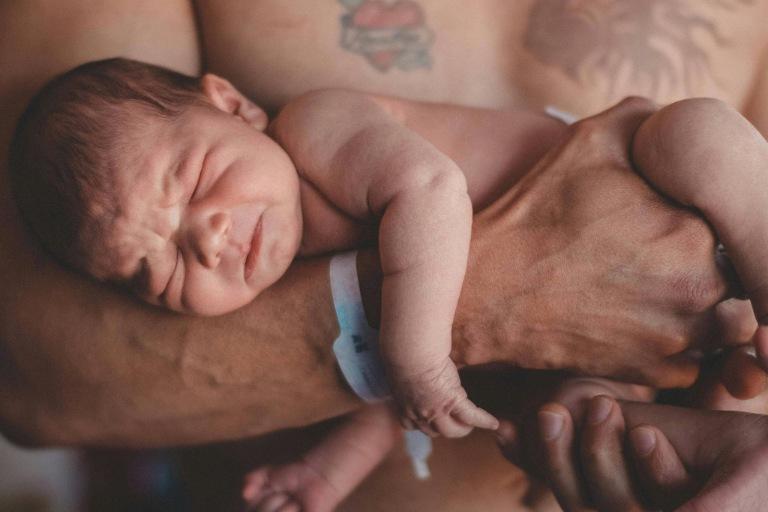It is important that both parents have skin-to-skin contact with baby.
Both parents having kin to skin contact with baby is important. Ican help the baby to settle. It controls temperature and heart rate. This also helps with bonding.
You and your partner will be offered an injection of Vitamin K for your baby after birth. We give this injection to prevent a rare bleeding disorder in some babies. This can also be given as oral drops – chat to your midwife about it.
Baby will be given a full physical examination before 72 hours of age and will include assessing the eyes, heart, hips (and testes if male). This is completed by a trained midwife or doctor. These checks will be repeated by your GP when your baby is around 6-8 weeks old.
Hearing screening will also take place on the ward before you go home. The screening nurses will check both ears. Sometimes, you might need to bring your baby back for a follow-up. It's common for babies to have fluid in their ears after delivery.
Ask the midwives on the ward or your community midwife any questions you have.
If your baby is born in hospital your partner and baby will stay on the ward until they’re ready for discharge home. This can depend on the type of delivery your partner has had, and how the baby responds to feeding. They can stay for 1 night, 2 nights, or a few days.
When your baby is 5 days old, you and your partner will be offered an important blood test for your baby called the Newborn Blood Spot Screening (NBSS). It checks for many different conditions that are rare but can make your baby very poorly. This is usually done at home by the midwife. Your baby will also be weighed on day 5, and the midwife will assess how feeding is going.
Depending on the support your baby or family needs, the midwife will discuss how often they will visit.
Ask your midwife or health visitor if you have any questions.

Jaundice
Jaundice is a common condition in new born babies that causes the skin and whites of the eyes to turn yellow. Jaundice is caused by a build-up of a substance called bilirubin in the blood. Babies sometimes have too much bilirubin in the first few weeks. It is usually harmless and goes away within 2 weeks without treatment. The midwife will check your baby at every visit. They might use a small device on the baby’s skin to measure jaundice levels. Sometimes, baby may need to go into hospital to have a blood test if the levels at home are a bit high or if your baby is unwell.
It is important to seek medical advice if:
· Your baby’s skin becomes more yellow (including their gums, palms or soles of the feet)
· The whites of their eyes are yellow
· The baby is more sleepy than usual
· Your baby is not feeding well
· Their poo changes colour back to green from yellow or is very pale.
If you are worried your baby is unwell you can contact your midwife, health visitor or GP in working hours. If you need to speak to someone in the evening or at weekends, you can contact:
· out of hours GP
· the postnatal ward
· 111
· A&E
Poo
In the first few days after your baby has been born, their poo will change colour. This is what you can expect:
· 1-2 days old - 1-2 or more wet nappies and 1 or more dark green/black ‘tar like’ poo (meconium).
- 3-4 days old: Look for 3 or more wet nappies that feel heavier. Also, check for 2 or more poos that change colour and consistency (brown, green, yellow, and looser).
· 5-6 days old – 5 or more heavy wet nappies and 2 or more soft yellow poos
· 7 days to 28 days – 6 or more heavy wet nappies and 2 or more soft yellow poos (at least £2 coin size)
Please note that it is common for babies to lose a small amount of weight in the first few days after delivery.
